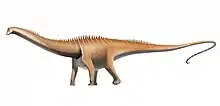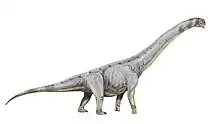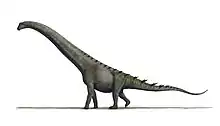Baurutitan
Baurutitan is a genus of sauropod dinosaur that lived during the Late Cretaceous in what is now Brazil. The type species, Baurutitan britoi, was described in 2005 by Kellner and colleagues, although the fossil remains had already been discovered in 1957. Baurutitan is classified as a lithostrotian titanosaur, and is distinguished from related genera based on its distinctive caudal vertebrae. This South American dinosaur was found in the Marília Formation near Uberaba, in the Brazilian state of Minas Gerais.[1]
| Baurutitan | |
|---|---|
| Scientific classification | |
| Kingdom: | Animalia |
| Phylum: | Chordata |
| Clade: | Dinosauria |
| Clade: | Saurischia |
| Suborder: | †Sauropodomorpha |
| Clade: | †Sauropoda |
| Clade: | †Eusauropoda |
| Clade: | †Neosauropoda |
| Clade: | †Macronaria |
| Clade: | †Titanosauria |
| Clade: | †Lithostrotia |
| Genus: | †Baurutitan Kellner et al. 2005 |
| Type species | |
| Baurutitan britoi Kellner et al. 2005 | |
Discovery
The remains of Baurutitan were found in 1957 by Llewellyn Ivor Price, famous Brazilian paleontologist, in the region of Peirópolis, Minas Gerais. It was, however, not until 2005 that it was officially published and named. The works of Price in Peirópolis began in 1947 after Jesuíno Felicíssimo Junior, from the Instituto Geográfico e Geológico of São Paulo, told him about the presence of fossils in the region. Price then conducted excavations in an old quarry, known as Quarry Caieira, on the in São Luis farm. Recovered fossils included those of turtles, crocodylomorphs, theropods and sauropods, fish, freshwater invertebrates (gastropods and bivalves), trace fossils, fragments of eggs, and plant debris. Dynamite was occasionally used to remove materials embedded in the matrix. There were expeditions to Caieira between 1949 and 1961, after which fieldwork was not continued due to a lack of new relevant findings.[1]
A series of 19 vertebrae (the last sacral and 18 caudals) found at this locality were recognized as belong to those of a titanosaur; they were initially named 'Series "C"', and subsequently became the holotype of the new genus Baurutitan (specimen number MCT 1490-R). All material found was stored in the collection of Museu de Ciência da Terra (Earth Science Museum – MCT) of the Departamento Nacional de Produção Mineral (National Department of Mineral Production) in Rio de Janeiro.[1]
Etymology
The name Baurutitan comes from the junction of the word "bauru", which alludes to the geographical region of the finding, within the Bauru Group, and the word "titan" of Greek myths. The specific name "britoi" is given in honor of Ignácio Aureliano Machado Brito, a Brazilian paleontologist who advised the study and description of this dinosaur, whose fossils have remained stored for many years.[1]
Description
Baurutitan was a sauropod which was estimated to have measured 12–14 metres (39–46 ft) long and had a height of around 3.5 metres (11 ft). The holotype specimen was found in the Marilia Formation, dating to the Maastrichtian epoch, some 72-66 million years ago. Baurutitan was the fourth sauropod described in Brazil, after Antarctosaurus, Gondwanatitan and Amazonsaurus.[1]
A 2017 cladistic analysis by José Carballido and colleagues places Baurutitan as a member of Lithostrotia.[2]
References
- Kellner, A.W.A.; Campos, D.d.A.; Trotta, M.N.F. (2005). "Description of a titanosaurid caudal series from the Bauru Group, Late Cretaceous of Brazil". Arquivos do Museu Nacional, Rio de Janeiro. 63 (3): 529–564.
- José L. Carballido; Diego Pol; Alejandro Otero; Ignacio A. Cerda; Leonardo Salgado ; Alberto C. Garrido ; Jahandar Ramezani ; Néstor R. Cúneo ; Javier M. Krause (2017). "A new giant titanosaur sheds light on body mass evolution among sauropod dinosaurs". Proceedings of the Royal Society B: Biological Sciences. 284 (1860): 20171219. doi:10.1098/rspb.2017.1219.












